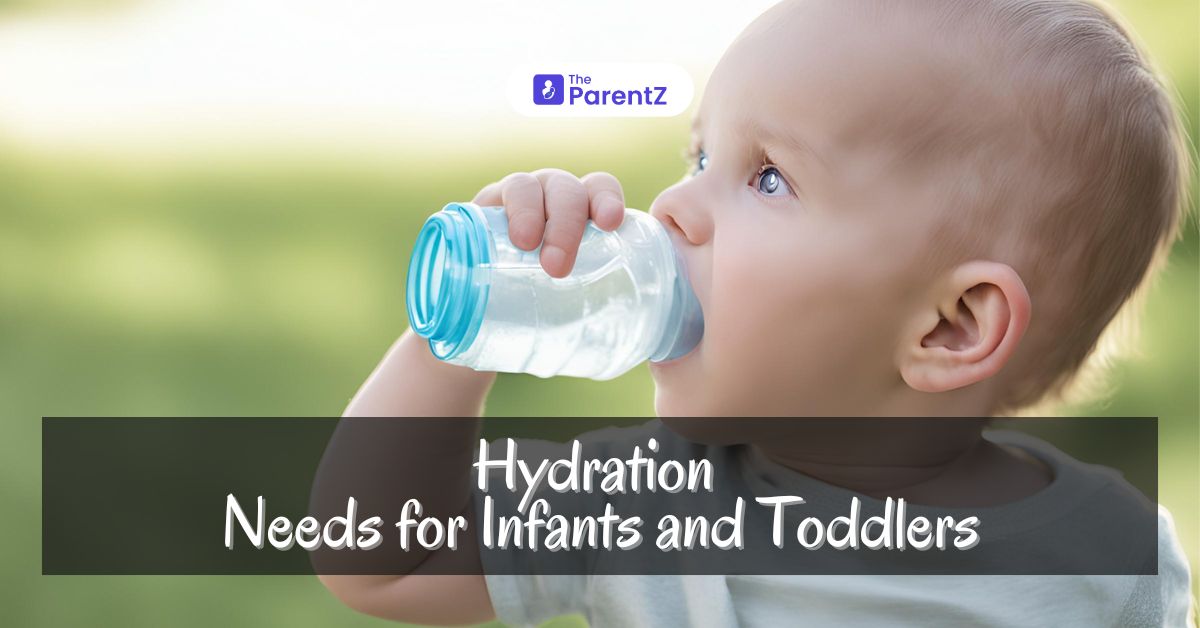Hydration is a critical component of health and development for infants and toddlers. During the early years of life, the body undergoes rapid growth and significant physiological changes, all highly dependent on adequate fluid intake. Proper hydration is essential for maintaining physical health, supporting cognitive development, and overall well-being. Inadequate hydration can lead to a range of health issues, including constipation, urinary tract infections, and, in severe cases, even heatstroke.
This article explores the unique hydration needs of infants and toddlers, the signs of dehydration, and practical strategies to ensure they receive adequate fluids.
Understanding Hydration Needs
Infants
Infants, particularly newborns, have a higher body water content than older children and adults, comprising about 75% of their body weight. This high water content is essential for numerous physiological functions, including nutrient transportation, temperature regulation, and metabolic processes. Given their limited ability to express thirst and rely on parents, understanding and meeting their hydration needs is crucial.
Breastfeeding and Formula Feeding:
For the first six months, breast milk or formula provides all the necessary fluids an infant needs. Breast milk is particularly beneficial as it contains the right balance of nutrients and electrolytes. Electrolytes, such as sodium, potassium, and chloride, are minerals that help maintain the balance of fluids in the body.
They play a crucial role in hydration, allowing the body to retain water and prevent dehydration. Breast milk is naturally rich in these electrolytes, making it an ideal source of hydration for infants. Formula, when prepared correctly, also provides sufficient hydration and a balance of electrolytes.
Exclusive breastfeeding or formula feeding should be maintained until about six months of age. Introducing water or other fluids before this age is generally not recommended unless advised by a pediatrician, as it can interfere with nutrient absorption and lead to potential imbalances. It’s important to follow professional advice, as introducing water too early can dilute the nutrients in breast milk or formula, potentially leading to nutritional deficiencies.
Transition to Solid Foods:
As infants begin to eat solid foods around six months of age, their hydration needs change. While breast milk or formula remains a primary source of fluids, small amounts of water can be introduced to complement their diet. This helps prevent constipation and supports the transition to more complex foods.
Toddlers
As children transition from infancy to toddlerhood, their activity levels increase, and their diets become more varied. Consequently, their hydration needs evolve. Toddlers generally require more fluids than infants due to increased physical activity and metabolic rates.
Daily Fluid Requirements:
The daily fluid requirement for toddlers (1-3 years) is approximately 1.3 litres, which includes fluids from beverages and food. This amount can vary based on climate, activity level, and individual health conditions. Children may need more fluids to stay hydrated in hot weather or during increased physical activity, such as playtime or sports. Monitoring their fluid intake and adjusting it accordingly is essential to ensure they are adequately hydrated.
Sources of Hydration:
• Water is the primary and best source of hydration. It should be offered regularly throughout the day, especially during and after physical activities.
However, it’s essential to avoid overhydration, as this can lead to a condition called water intoxication, which can be dangerous, particularly for infants. It’s best to offer water in moderation, based on their age and activity level.
• Milk: Provides essential nutrients like calcium and vitamin D. Whole milk is recommended for children up to 2 years old, after which low-fat or skim milk can be introduced. It’s important to note that while milk is a good source of hydration, it should not be the sole source. Water and other fluids should also be included in their diet.
• Juice: If given, it should be limited to no more than 120 ml of 100% fruit juice per day. Excessive juice consumption can lead to dental problems and unnecessary calorie intake.
• Food: Many foods, especially fruits and vegetables, contain high water content and contribute to overall hydration. For infants, examples include pureed fruits like watermelon and oranges and pureed vegetables like cucumbers. You can offer water-rich fruits like grapes, strawberries, and vegetables like celery and lettuce for toddlers.
Signs of Dehydration
Recognizing the signs of dehydration in infants and toddlers is important, but it’s critical for timely intervention. Dehydration can occur rapidly in young children and can lead to serious health issues if not addressed promptly. Be vigilant and proactive in ensuring your child’s hydration, which is crucial.
Mild to Moderate Dehydration
• Dry Mouth and Tongue: A clear indicator that the child needs more fluids.
• Fewer Wet Diapers: Infants should have about 6-8 wet diapers daily, while toddlers should urinate at least every 4-6 hours.
• Fussiness or Irritability: Dehydration can cause discomfort, leading to increased crying or agitation.
• Lethargy: A noticeable decrease in activity levels or unusual sleepiness.
Severe Dehydration
• Sunken Eyes and Fontanel (in infants): The soft spot on top of a baby’s head may appear sunken.
• Cool, Discolored Hands and Feet: Poor circulation due to low fluid volume.
• Rapid Heartbeat and Breathing: The body attempts to compensate for low blood volume.
• No Tears When Crying: Indicates a significant fluid deficit.
• Extreme Fussiness or Drowsiness: A potential sign of severe dehydration requiring immediate medical attention.
Practical Strategies for Ensuring Adequate Hydration
For Infants
1. Breastfeeding on Demand: Breastfeeding infants whenever they show signs of hunger or thirst helps maintain proper hydration.
2. Proper Formula Preparation: Following guidelines for formula preparation to avoid over-dilution or concentration.
3. Introducing water at the Right Time: Gradually introduce small sips of water around six months of age when solid foods are introduced.
For Toddlers
1. Regular Water Intake: Encouraging frequent sips of water throughout the day, especially during and after playtime.
2. Healthy Beverage Choices: Limit sugary drinks and provide water and milk as primary beverages.
3. Hydration-Rich Foods: Including fruits and vegetables like watermelon, cucumbers, and oranges in their diet to boost fluid intake.
4. Modeling Good Habits: It is crucial to demonstrate regular water consumption and make it a family habit.
5. Monitoring Urine Output: Ensuring toddlers have regular and clear urination as a sign of adequate hydration.
Addressing Special Situations
Certain conditions and situations require heightened attention to hydration needs.
Illness:
Fluid loss can increase significantly during fever, vomiting, or diarrhoea episodes. Oral rehydration solutions (ORS) can replace lost electrolytes and fluids.
Hot Weather:
High temperatures can lead to increased fluid loss through sweating. Offering additional fluids and ensuring children remain calm and shaded can prevent dehydration.
Physical Activity:
Active toddlers may require more fluids. Providing water before, during, and after physical activities helps maintain hydration.
Conclusion
Ensuring proper hydration for infants and toddlers is foundational to promoting their health and development. As parents, you play a crucial role in monitoring fluid intake, recognising signs of dehydration, and implementing strategies to maintain adequate hydration. By understanding the unique hydration needs of young children and taking proactive measures, you can support the well-being and growth of your infants and toddlers, laying the groundwork for a healthy future.





Be the first one to comment on this story.